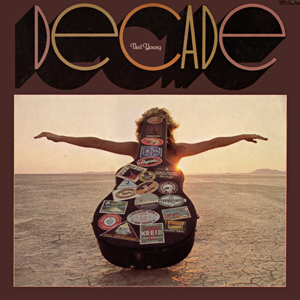
Decade is a compilation album by Canadian–American musician Neil Young, originally released in 1977 as a triple album and later issued on two compact discs. It contains 35 of Young's songs recorded between 1966 and 1976, among them five tracks that had been unreleased up to that point. It peaked at No. 43 on the Billboard Top Pop Albums chart, and was certified platinum by the RIAA in 1986.

Rush was a Canadian rock band formed in Toronto in 1968 that primarily comprised Geddy Lee, Alex Lifeson (guitar) and Neil Peart. The band's original line-up comprised Lifeson, drummer John Rutsey, and bassist and vocalist Jeff Jones, whom Lee immediately replaced. After Lee joined, the band went through a few line-up changes before arriving at its classic power trio line-up with the addition of Peart in July 1974, who replaced Rutsey four months after the release of their self-titled debut album; this line-up remained unchanged for the remainder of the band's career.
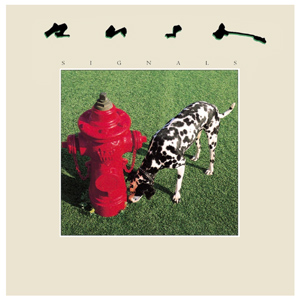
Signals is the ninth studio album by Canadian rock band Rush, released on September 9, 1982 by Anthem Records. After the release of their previous album, Moving Pictures, the band started to prepare material for a follow-up during soundchecks on their 1981 concert tour and during the mixing of their subsequent live album Exit...Stage Left. Signals demonstrates the group's continuing use of synthesizers, sequencers, and other electronic instrumentation. It is the last album produced by their longtime associate Terry Brown, who had worked with them since 1974.

A Farewell to Kings is the fifth studio album by Canadian rock band Rush, released on Anthem Records on August 29, 1977. The album reached No. 11 in Canada and marked a growth in the band's international fanbase, becoming their first Top 40 album in the US and the UK.
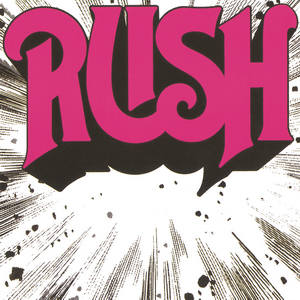
Rush is the debut studio album by Canadian rock band Rush. It was released on March 18, 1974, in Canada by Moon Records, the group's own label, before it was released internationally by Mercury Records later that year. Recorded five years after the band's formation, this first release shows much of the hard rock sound typical of many of the popular rock bands emerging earlier in the decade. Rush were fans of such bands as Led Zeppelin, Yes and Cream, and these influences can be heard in most of the songs on the album.
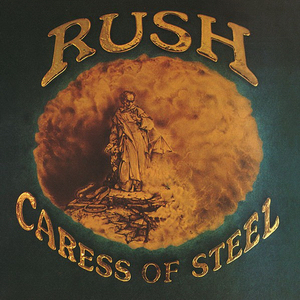
Caress of Steel is the third studio album by Canadian rock band Rush, released on September 24, 1975, by Mercury Records. It was recorded immediately after the band concluded touring in support of their previous album, Fly By Night, and marked a development in the group's sound, moving from the blues-based hard rock style of their debut towards progressive rock. Caress of Steel is considered Rush's first progressive rock album. Songs such as "The Necromancer" furthered Rush's advancement into narrative-driven, fantasy-based compositions, while "The Fountain of Lamneth" was their first prog-rock "epic" to span an entire side of vinyl. Other tracks like "Bastille Day" and "Lakeside Park" became staples of the band's live setlists.
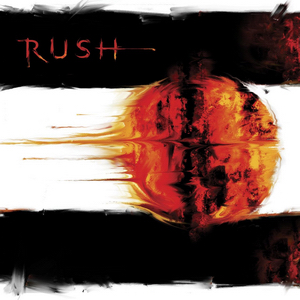
Vapor Trails is the seventeenth studio album by Canadian rock band Rush. It was released on May 14, 2002, on Anthem Records, and was their first studio release since Test for Echo (1996), the longest gap between two Rush albums. After the Test For Echo tour finished in July 1997, drummer and lyricist Neil Peart suffered the loss of his daughter and then his wife in separate tragedies. As a result, the group entered an extended hiatus during which it was not certain they would continue. They eventually reunited in January 2001 to rehearse material for a new album, recording for which lasted until December. For the first and only time since Caress of Steel (1975), the group did not use any keyboards or synthesizers in their music, incorporating many layers of guitar, bass and drums instead.

All the World's a Stage is a double live album by Canadian rock band Rush, released in September 1976 by Mercury Records. The album was recorded at Massey Hall in Toronto on June 11–13, 1976, during the band's breakthrough 2112 tour. The title of the album alludes to William Shakespeare's play As You Like It, and would again be referenced by Rush in the 1981 song "Limelight".

Power Windows is the eleventh studio album by Canadian rock band Rush, released on October 11, 1985 in Canada by Anthem Records and on October 21, 1985 in the United States. After touring in support of their previous album, Grace Under Pressure (1984), the band took a break and reconvened in early 1985 to begin work on a follow-up. The material continued to display the band's exploration of synthesizer-oriented music, this time with the addition of sampling, electronic drums, a string section, and choir, with power being a running lyrical theme. Power Windows was recorded in Montserrat and England with Peter Collins as co-producer and Andy Richards on additional keyboards.

Rush in Rio is a three-disc live album by the Canadian band Rush, released on October 21, 2003. The album is also available as a two-DVD set. With the exception of the last two tracks on the third disc, the album was recorded at Maracanã Stadium in Rio de Janeiro on the final night of the Vapor Trails Tour. The other two tracks were taken from previous shows on the same tour. "Between Sun & Moon" was recorded at the Cricket Wireless Pavilion, Phoenix, Arizona, on September 27, 2002, and "Vital Signs" was recorded at the Colisée Pepsi, Quebec City, Quebec, on October 19, 2002.
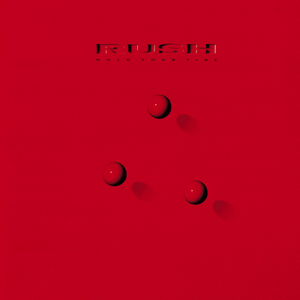
Hold Your Fire is the twelfth studio album by Canadian progressive rock band Rush, released on September 8, 1987. It was recorded at The Manor Studio in Oxfordshire, Ridge Farm Studio in Surrey, AIR Studios in Montserrat and McClear Place in Toronto. Hold Your Fire was the last Rush studio album released outside Canada by PolyGram/Mercury. 'Til Tuesday bassist and vocalist Aimee Mann contributed vocals to "Time Stand Still" and appeared in the Zbigniew Rybczyński-directed video.
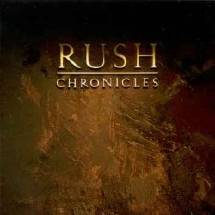
Chronicles is a double compilation album by Canadian rock band Rush, released in 1990. The collection was the band's first album to be released in the 1990s, though it was assembled without the participation of the band. A companion edition of Rush music videos from 1981 to 1987, titled Chronicles: The Video Collection, was also released on VHS and laserdisc on October 23, 1990. The video edition was re-released on a single DVD in 2001, titled Rush Chronicles – The DVD Collection, with two additional video tracks that are hidden Easter eggs.

Retrospective II: 1981 to 1987 is a compilation album by Canadian rock band Rush, released in 1997. The album features songs from the second decade of the band.

After the Gold Rush is the third studio album by the Canadian-American musician Neil Young, released in September 1970 on Reprise Records. It is one of four high-profile solo albums released by the members of folk rock group Crosby, Stills, Nash & Young in the wake of their chart-topping 1970 album Déjà Vu. Young's album consists mainly of country folk music along with several rock tracks, including "Southern Man". The material was inspired by the unproduced Dean Stockwell-Herb Bermann screenplay After the Gold Rush.
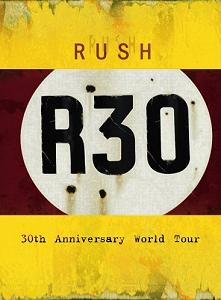
R30: 30th Anniversary World Tour is a live DVD by the Canadian rock band Rush, released on November 22, 2005 in Canada and the US, and November 28, 2005 in Europe. The DVD documents the band's R30: 30th Anniversary Tour, and was recorded on September 24, 2004 at the Festhalle Frankfurt, Germany.

The Spirit of Radio: Greatest Hits 1974–1987 is a compilation album by Canadian rock band Rush, released on February 11, 2003. It includes many of the band's most popular songs from their Mercury Records era, but does not feature any material from their third album Caress of Steel. A special edition of the album included a DVD containing music videos for several songs, including "Mystic Rhythms".
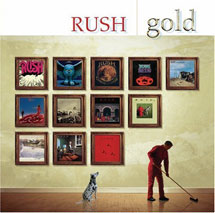
Gold is a compilation album by Canadian rock band Rush, released on April 25, 2006.

"One Little Victory" is the opening track and first single from Rush's 2002 album Vapor Trails, with music by Geddy Lee and Alex Lifeson, and lyrics by Neil Peart. The title phrase was inspired by a line from Joni Mitchell's "Sunny Sunday." To herald the band's comeback after a five-year hiatus, the single was designed to grab the attention of listeners with its rapid guitar and drum tempos.
"Freewill" is the second track on the 1980 album Permanent Waves by Canadian progressive rock band Rush. The song's music was composed by Geddy Lee and Alex Lifeson, and its lyrics written by Neil Peart. In a 2016 review of Rush discography for Ultimate Classic Rock, Eduardo Rivadavia described "Freewill" as a "cerebral but remarkably radio-friendly" song. Lee has stated that the final verse of "Freewill" is at the highest part of his vocal range.

Retrospective III: 1989–2008 is a compilation album by Canadian rock band Rush released on March 3, 2009. The album is a collection of songs from the third and fourth decades of the band (1989–2008), which they spent signed to Atlantic Records. The album is available in two versions. The 2-disc version includes a DVD of music and live videos.



















